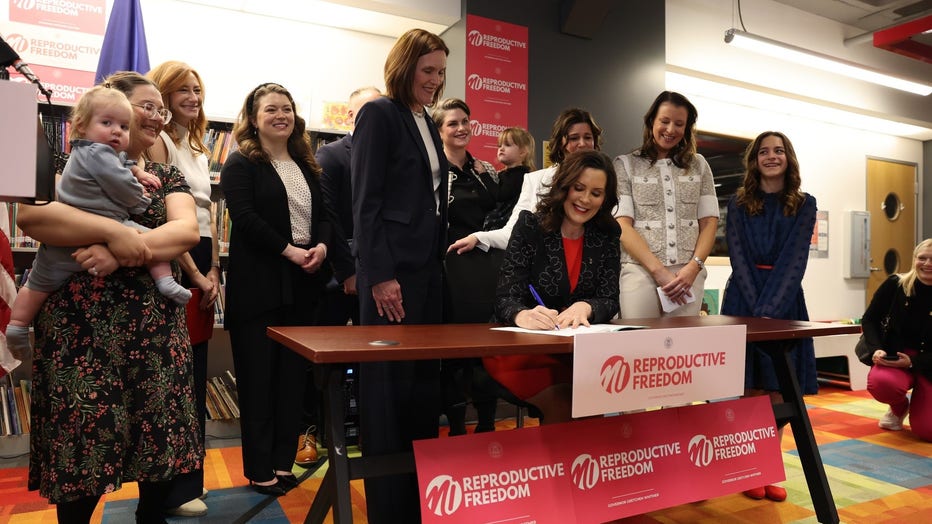Whitmer repeals Michigan law that made it only U.S. state to ban surrogacy contracts

Whitmer scolds Republicans over reproductive voting record
During a bill-signing event in Royal Oak where Gretchen Whitmer approved a package of laws that decriminalized surrogacy contracts in Michigan, she took aim at conservative lawmakers who voted against repealing the ban - the nation's only one.
ROYAL OAK, Mich. (FOX 2) - The Michigan governor signed a package of bills aimed at protecting access to multiple avenues for reproduction on Monday, including repealing one law that made the state the only one in the U.S. to outlaw surrogacy contracts.
In passing the nine-bill package, Gretchen Whitmer pitched the state as a haven for reproductive rights while slamming conservative lawmakers for voting against the bills.
"Either you support families or you don't, and it's pretty clear there's a divided line here where Democrats are making it easier to decide when and whether to start a family and how they start a family," she said after signing the Michigan Family Protection Act. "Republicans say no to all of that, and it's incredibly cruel and anti-family. It's surprising."
The bills passed along mostly party lines with two Republican senators - Sen. Jon Bumstead and Mark Huizenga - siding with Democrats.
Whitmer was at the Royal Oak Public Library for the signing on Monday morning.
She was flanked by advocates of the legislation, as well as state Rep. Samanatha Steckloff (D-Farmington Hills), who helped spearhead the push for equal rights for children born by surrogacy. The bills also regulate the practice of surrogacy and eliminate a barrier that requires LGBTQ+ families get proper documentation before they can be confirmed as parents of a child.
"Families have been through absolutely hell to get to where we are," said Steckloff after the signing.

The legislation is the latest expansion of reproductive rights that Michigan Democrats have passed since taking a majority in the legislature.
Along with decriminalizing paid surrogacy agreements, House Bills 5207-5215 do the following:
- Requires the State Registrar to create a new birth certificate in connection with the updated surrogacy law lifting the ban on paid contracts
- Deletes the sentencing guidelines previously associated with the old surrogacy law
- Expand the rights of children conceived through a surrogacy agreement, including who would be considered their intended parents
- Prohibit genetic testing from being used to challenge the parentage of a parent or donor who complied with the law
In a speech delivered before the bill passed the senate chamber, Republican Sen. Thomas Albert said the previous law may be inconvenient, but it helps "maintain a clear establishment of a parent-child relationship in our society."
He added the new laws treat the parties involved in the surrogacy process as commercial products, arguing "these bills create whole new paths of parenthood" without considering the relationship between the guardians.

Many worry landmark Alabama Supreme Court ruling on embryos could replicate on larger scale
Among the many questions the controversial ruling has created, include if there could be changes where future doctors choose to practice.
Right to Life, an opponent of the package, criticized its passage as an attempt to mislead voters that reproductive health options were at risk in Michigan.
"This could not be further from the truth," said Amber Roseboom, president of the group. "IVF has been operating in Michigan since the 70s. There is no threat to it, nor has there been. There is absolutely no parallel in Michigan to Alabama’s recent, isolated issue."
Concerns about access to IVF were pushed into the spotlight this year after the state Supreme Court in Alabama ruled frozen embryos should be equated to children.
But Michigan Democrats have countered that all legal forms of reproductive health have been at risk since the U.S. Supreme Court repealed Roe V. Wade, throwing access to abortion into question.


